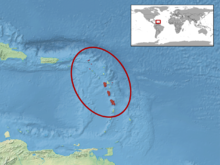Lesser Antillean Iguana
| Lesser Antillean iguana | |
|---|---|
 |
|
| Lesser Antillean iguana in Coulibistrie, Dominica | |
| Scientific classification | |
| Kingdom: | Animalia |
| Phylum: | Chordata |
| Class: | Reptilia |
| Order: | Squamata |
| Family: | Iguanidae |
| Genus: | Iguana |
| Species: | I. delicatissima |
| Binomial name | |
|
Iguana delicatissima Laurenti, 1768 |
|
 |
|
The Lesser Antillean iguana (Iguana delicatissima) is a large arboreal lizard endemic to the Lesser Antilles. It is one of two species of lizard of the genus Iguana and is in severe decline due to habitat destruction, feral predators, hunting, and hybridization with its sister species, the green iguana. Successful captive breeding of this species has been limited to only two instances as most captive laid eggs tend to be infertile.
Another common name for it is the West Indian iguana, though this is more commonly used for species of the genus Cyclura.
The generic name iguana is derived from iwana, a Spanish form of the Taino name for the species. Its specific name delicatissima is Latin for "extraordinary". The species was first officially described by Austrian naturalist Josephus Nicolaus Laurenti in 1768.
The Lesser Antilles iguana has a more blocky, shortened face than the green iguana and lacks the distinctive stripe pattern present along the green iguana's tail. The feature that most easily distinguishes these two species is the large, round scale that the green iguana has below each ear hole but which the Lesser Antillean iguana lacks.
The Lesser Antillean iguana varies in color between different island populations, but the base color tends to be gray, with green splotching on the underside. They have large pale, ivory colored scales on their heads. The jowls of males are pink and the scales around the eyes are blue. Males also have femoral pores along each inner thigh that exude pheromones during breeding season. Males are larger than females and are 40 cm (15.5 in) long, with an 80 cm (31.5 in) tail when full-grown. Females are two-thirds this size.
The Lesser Antillean iguana is found in scrub woodland, rainforest, and mangrove throughout the Lesser Antilles on Saint Barth, Anguilla, St. Martin, St. Eustatius, Antigua, Guadeloupe, Dominica, and Martinique.
...
Wikipedia

